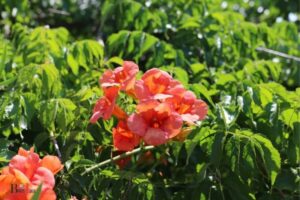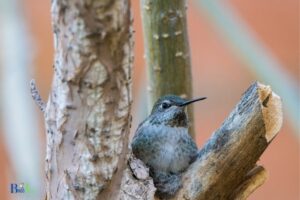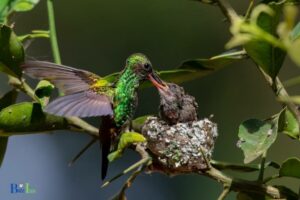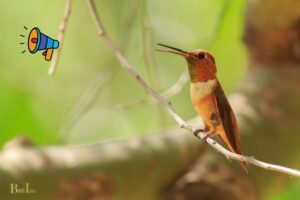Can You Make Hummingbird Food Ahead of Time? Yes!
Yes, you can make hummingbird food ahead of time and store it for future use.
Preparing hummingbird food in advance can be a convenient option, especially during peak feeding times when these tiny birds consume more nectar.
Homemade hummingbird food, also known as sugar water, is a simple mixture of sugar and water that you can easily store in the refrigerator for up to two weeks.
To store the homemade hummingbird food for future use, allow the sugar water mixture to cool completely after boiling. Transfer the cooled mixture into a clean, airtight container, and store it in the refrigerator for up to two weeks.
When you’re ready to fill your hummingbird feeder, simply give the stored nectar a quick stir and pour it into the feeder, ensuring it’s clean and free from any debris or mold.
Regularly clean and refill the feeder to prevent mold growth and keep your hummingbirds healthy and happy.
Instructions to Make Hummingbird Food Ahead of Time
| Can You Make Hummingbird Food Ahead of Time? | Instructions | Storage Method | Storage Duration |
|---|---|---|---|
| Yes | 1. Mix 4 parts water with 1 part sugar to create sugar water. 2. Boil the mixture for 2 minutes to dissolve the sugar and remove impurities. 3. Allow the mixture to cool completely. | Store in a covered container or bottle in the refrigerator. | Up to 2 weeks. |
Key Takeaway
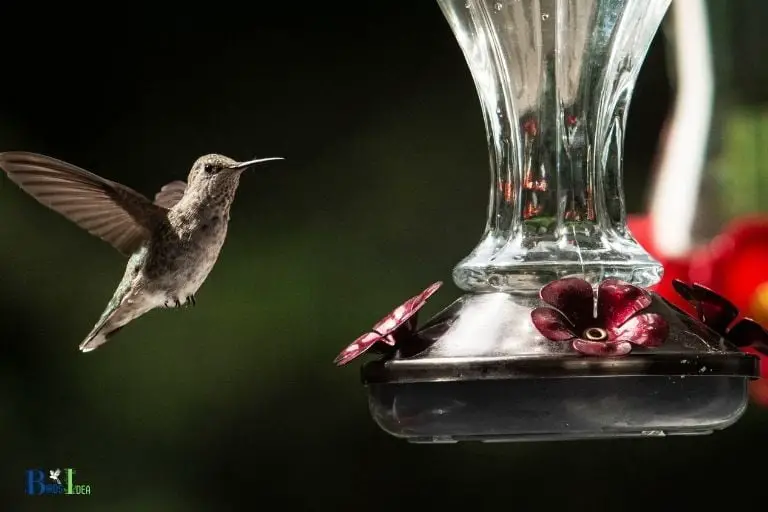
Four Facts About Making Hummingbird Food Ahead of Time
Understanding Hummingbirds And Their Needs
Hummingbirds are fascinating creatures that bring life to any garden or backyard. Watching them dart around as they feed is a delight to any bird lover.
These tiny birds have very specific needs when it comes to their diet, and it’s essential to understand these needs to provide the best care for them.
In this blog post, we will discuss the overview of hummingbirds’ diet, their nutritional requirements, the importance of providing fresh food, common feeding problems, and how to avoid them.
Overview Of Hummingbirds’ Diet
Hummingbirds require a diverse diet to meet their high energy demands. Their diet primarily consists of nectar from flowers and insects, which provides them with both carbohydrates and protein.
Additionally, they also feed on tree sap, spiders, and small insects such as fruit flies and gnats. Hummingbirds need to consume about half their body weight in food every day to fuel their high metabolism.
Nutritional Requirements Of Hummingbirds
Hummingbirds require a high sugar diet to fuel their constant flight and active lifestyle. They also need to consume sufficient amounts of protein and vitamins to maintain their health and energy levels.
A lack of proper nutrition can weaken hummingbirds, making them more susceptible to illness and less able to survive harsh weather conditions.
The Importance Of Providing Fresh Food For Hummingbirds
Hummingbirds are sensitive creatures that rely on their sense of sight to locate food. They are attracted to bright colors, and feeding on fresh nectar is vital to their health.
Moldy or stale nectar can make hummingbirds sick, causing digestive problems and even death. Ensure that hummingbird feeders are cleaned regularly, and the nectar is replaced every two to three days.
Common Feeding Problems And How To Avoid Them
- Bees and wasps: These insects can be a nuisance around hummingbird feeders. To avoid attracting them, choose feeders with bee guards or ant moats. Additionally, placing the feeder away from flowers that attract bees can help deter them.
- Spilled nectar: If the feeder is not hung correctly or the nectar is too full, it can easily spill, causing ants to invade. Using an ant moat or hanging the feeder with fishing line can help prevent ants from reaching the nectar.
- Moldy nectar: Mold can grow quickly in warm weather conditions, making nectar toxic to hummingbirds. To avoid this problem, clean the feeder thoroughly and replace the nectar every two to three days, depending on the weather.
Overall, understanding hummingbirds’ diet and their specific needs is crucial when providing them with food. Fresh nectar, clean feeders, and a diverse diet are essential to their health and energy levels.
With proper care, you can enjoy the beauty of these tiny birds and help them thrive in your backyard.
Preparing Hummingbird Food Ahead Of Time
Choosing The Right Recipe
Preparing hummingbird food ahead of time is an excellent idea to keep your feathered friends fed and happy, whether you are hosting a gathering or away from home for a while.
Choosing the right recipe for hummingbird food is crucial, as it can affect their health and energy levels. You may come across many hummingbird food recipes, but not all of them are suitable.
Here is what to consider when choosing the right recipe:
- Avoid using red dye: Hummingbirds are attracted to the color red, but do not use red dye in the concoction. It can be harmful to their health.
- Use quality sugar: A mixture of four parts water and one part sugar is an excellent recipe. However, make sure you use high-quality white granulated sugar without adding honey, brown sugar, or other sweeteners.
- Avoid artificial sweeteners: Never use artificial sweeteners in the mixture as they contain chemicals that can harm hummingbirds.
Storing Hummingbird Food Safely
When preparing hummingbird food, you can store the mixture in the refrigerator for up to several days. However, it is essential to store the mixture safely to avoid spoilage and contamination.
Here’s how to do it:
- Keep it covered: Always use a tight-fitting lid or cover when storing hummingbird food to prevent contamination by insects, dust, or debris.
- Choose safe containers: Only use food-grade containers when storing hummingbird food. Plastic or glass containers with tight lids are ideal.
- Label the container: To avoid confusion, label the container with the date of preparation.
Factors To Consider When Making Hummingbird Food Ahead Of Time (Including Temperature And Humidity)
When preparing hummingbird food ahead of time, it’s crucial to consider some factors that can affect the quality and safety of the mixture.
Here are some key considerations:
- Store it in the right temperature: Hummingbird food can spoil if stored in high temperatures. Keep the mixture in a cool, dry place or the refrigerator.
- Store it in the right humidity: Humidity can also impact the quality and safety of hummingbird food. Keep it in a dry place away from moisture and dampness.
Tips For Extending The Shelf Life Of Homemade Hummingbird Food
To extend the shelf life of homemade hummingbird food, you must store it correctly and keep it fresh.
Here are some tips to help maximize the shelf life of your homemade hummingbird food:
- Store it in the refrigerator: Storing the mixture in the refrigerator significantly extends its shelf life. You can store it for up to two weeks.
- Discard old mixture: If you notice any discoloration, mold, or foul smell, discard the old mixture and prepare a fresh one.
- Use clean containers: Always use clean containers with tight lids to store hummingbird food. This prevents contamination and spoilage.
Preparing hummingbird food ahead of time is a great way to keep your feathered friends happy and healthy. However, keep safety and quality in mind when preparing, storing, and serving the mixture.
By using these tips and best practices, you can ensure your homemade hummingbird food is fresh and delicious all year round!
Benefits And Risks Of Making Hummingbird Food Ahead Of Time
Can You Make Hummingbird Food Ahead Of Time?
Hummingbirds require a lot of energy to sustain their high metabolism, and they need to consume half their body weight in nectar every day.
While it’s essential to keep hummingbirds fed, it’s also essential to maintain the quality and freshness of the nectar. This brings up the question – can you make hummingbird food ahead of time?
We discuss the benefits and risks of making hummingbird food ahead of time and the right approach to balance convenience with the needs of hummingbirds.
Pros Of Making Hummingbird Food Ahead Of Time
If you’re an avid bird watcher, making hummingbird food ahead of time comes with several benefits.
Here are some of the advantages:
- Convenience: Making hummingbird food in bulk is convenient, especially if you have a lot of hummingbirds visiting your garden. You won’t have to keep up with their daily feeding schedules, saving you time and effort.
- Saves money: Buying nectar commercially can be expensive, and making it at home saves money in the long run. Making hummingbird food in bulk can also help you save on additional ingredients and reduce wastage.
- Encourages hummingbird visits: By ensuring that hummingbird food is always available, you can attract more hummingbirds to your garden. This creates a perfect opportunity for bird watching and helps you appreciate nature more.
Cons Of Making Hummingbird Food Ahead Of Time
Despite the benefits of making hummingbird food ahead of time, it also comes with some risks.
Here are some of the disadvantages:
- Spoilage: Hummingbird nectar can spoil quickly, especially when exposed to high temperatures. Making nectar in bulk and storing it for extended periods can lead to its spoilage, which can be harmful to birds.
- Fermentation: Hummingbird nectar contains sugar, which can ferment and produce ethanol when exposed to air. If consumed by hummingbirds, fermented nectar can cause health complications and even lead to death.
- Hygiene concerns: Storing nectar for extended periods can attract bees, ants, and other insects that can contaminate the nectar. Consuming contaminated food can be harmful to hummingbirds.
How To Balance Convenience With The Needs Of Hummingbirds
To balance convenience with the needs of hummingbirds, here are some tips to consider:
- Make small batches of nectar: Making small batches of nectar often reduces spoilage and helps maintain its freshness. Plus, this will ensure that enough nectar is available for hummingbirds to consume daily.
- Store nectar in the refrigerator: Store excess nectar in the refrigerator to extend its shelf-life while ensuring its freshness. Always discard nectar that has been in storage for more than a week.
- Clean and sanitize feeders: Keep hummingbird feeders clean and sanitize them weekly to remove any contaminants that may be present. Clean any leftover food before refilling, and only use feeders that are in good condition.
- Always use fresh ingredients: Only use fresh water and regular granulated white sugar to make hummingbird food. Avoid using honey, brown sugar, or other sweeteners as they contain preservatives that can be harmful to hummingbirds.
Making hummingbird food ahead of time is convenient, but it comes with risks that can be detrimental to birds’ health.
To ensure hummingbirds’ well-being, make small batches of fresh nectar, store it in the refrigerator, and keep hummingbird feeders clean and sanitized.
By following these tips, you can strike a balance between convenience and the needs of hummingbirds and enjoy bird watching all year round.
FAQ About Hummingbird Food
Can Hummingbird Food Be Made Ahead Of Time?
How Far Ahead Can You Make Hummingbird Nectar?
Can You Freeze Hummingbird Nectar?
Can I Store Hummingbird Food At Room Temperature?
How Often Should I Change The Hummingbird Food?
Conclusion
After learning about the benefits and drawbacks of making hummingbird food ahead of time, it’s clear that it’s possible to do so. However, it’s important to store it properly to ensure freshness and the safety of the birds.
Additionally, making fresh food daily is a great way to develop a routine and bond with your backyard hummingbirds.
Whether you choose to make it ahead of time or not, the most important aspect is the quality of the food.
By using pure cane sugar and boiling the water, you can ensure that your hummingbirds are receiving nutritious and high-quality nectar.
Overall, taking the time to properly prepare hummingbird food shows your love and dedication to providing a welcoming environment for these fascinating creatures.
So, go ahead and experiment with different techniques to find what works best for you and your feathered friends!


